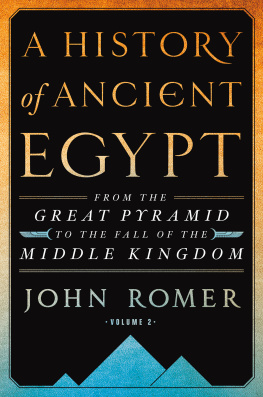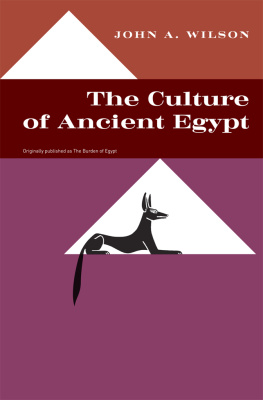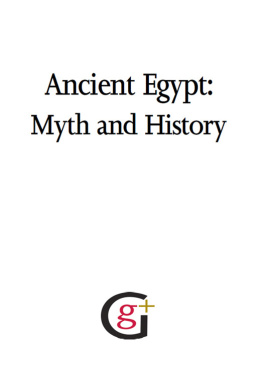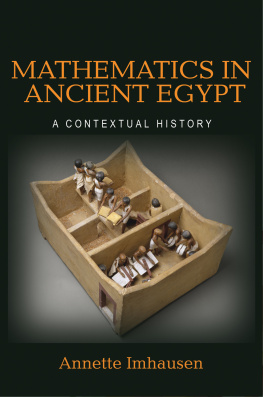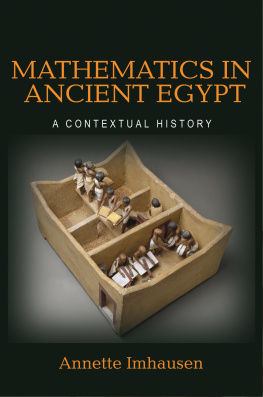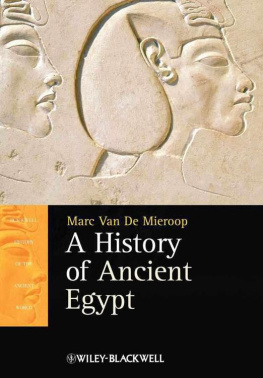Contents
Guide
JOHN ROMER
A History of Ancient Egypt,
Volume 2
From the Great Pyramid to the
Fall of the Middle Kingdom
Thomas Dunne Books
St. Martins Press
New York

The author and publisher have provided this e-book to you for your personal use only. You may not make this e-book publicly available in any way. Copyright infringement is against the law. If you believe the copy of this e-book you are reading infringes on the authors copyright, please notify the publisher at: http://us.macmillanusa.com/piracy.
The first volume of this history described the creation of the pharaonic state and ended at around 2550 BC with the building of the Great Pyramid of Giza. For the most part it was a silent history, since hardly any writings have survived which illuminate that millennial process. This second volume, alternatively, moves into an altogether noisier era for it begins as the archaic silence of those early pyramids is slowly broken by a growing chatter of hieroglyphic texts and it ends at around 1770 BC , with the pharaonic state in full bloom and with its scribes having created an elegant courtly literature.
The timelines of the two volumes do not meet at a single point but are spliced together at an angle across the century in which the Great Pyramid was built and at the time when the use of texts and inscriptions had started to increase. The history in this second volume, therefore, is different from that of Volume 1, for the growing presence of those texts allows the possibility of ancient thought as expressed in written language to become part of the main narrative.
History, it is commonly observed, is a dialogue between past and present worlds. As far as the modern history of ancient Egypt is concerned, where ancient texts have always been the key, it is essentially a dialogue between those ancient texts and the two centuries of Western scholarship that have followed their decipherment. A dialogue so commanding that the attitudes and opinions of a handful of leading Western academics are as much a part of modern ancient Egypt as are the pyramids of Giza.
It seems to me, therefore, that to avoid confusion, the author of any new history of pharaonic culture should outline how and why their vision differs from that which underlies that standard modern version of ancient Egypt.
Given that the roots of the modern humanities lie in the study of the classics it is hardly surprising that the first Western histories of that freshly deciphered ancient culture were based on the narratives of classical historians, and thus they were concerned with political, ethnic and dynastic struggle. At the same time, however, those histories were created at the beginning of the modern age in Europe, in times of social and industrial revolution, when the concepts of the nation state and of imperialism were burning fierce and fresh. So the protagonists in those pharaonic histories were fired with the spirit of that age, with themes of wealth and war, class, ethnicity and overweening power. And given contemporary Egypts place within that nineteenth-century world, they were acted out against an oriental backdrop.
In reality, however, the hundred and fifty generations that built and maintained pharaonic culture have long gone, and precious little of them or of their history remains. And the yawning gaps in the fundamental information required to build the usual narratives of Western history books are still bridged by the attitudes and assumptions of nineteenth-century historians. And theres the rub, for although their traditional tales lend pharaohs alien relics an illusion of familiarity, they have deeply sinister undertones.
For modern-day ancient Egypt is a direct offspring of the nineteenth centurys intense study of race and ancient language; those same studies whose terms and concepts later served to ratify the underlying character of Hitlers Third Reich. This is not, of course, to assert that the academics of several different nationalities who laid down the foundations of modern-day ancient Egypt were particularly sadistic, or especially racist or, indeed, imperialist, but simply that they shared a tenor of their times. Georg Steindorff, for example, a one-time rector of Leipzig University and the most renowned egyptological victim of Nazi persecution, regarded himself as a full member of the nation whose high conservative values he had upheld all his life. In the years before the First World War, Steindorff had written a popular and influential history, Die Bltezeit des Pharaonenreichs literally, the heyday the flowering of the pharaonic empire, which describes ancient Egypt admiringly as an imperial power. A decade earlier, Adolf Erman, the founder of modern egyptology and Steindorffs professor at Berlin, had observed that the ancient Egyptians had never experienced the invigorating influence of a great national war. Though differing in expression, their phantasmagorical preoccupation with empire building as a moral force is the same and was a product of their times. Along with several other academic colleagues, however, Walter Grapow, Ermans coeditor of the standard dictionary of the ancient Egyptian language was, indeed, an ardent Nazi, a person for whom great histories were forged by mighty individuals, and such dictionary entries as kingdom, blood and soil Reich, Blut and Boden held immediate contemporary resonance. And in the following generation those ideas were enlarged to contain the notion that pharaoh had been a god-like personality, the embodiment of the principles of blood and soil which, they considered, had run deep within that ancient race. Down to this day, indeed, alongside other equally unproven assumptions, many specialists would still assert that the ancient Egyptian kingdom had been born in blood and battle and that the living pharaoh had been held to be a god.
In my first years in Egypt, in the 1960s, I met and worked with several kindly scholars who had been students of some of the founders of the so-called Berlin School and they introduced me to ancient Egypt and its modern academic literature in long and generous conversations. Many now-retired professors were taught by that same generation; modern-day egyptology, indeed, is largely composed of generations who are the direct inheritors of that complex tradition. Several current university course books, also, were written by egyptologists who had enthusiastically greeted Hitlers rise to power or who were later banned outright from teaching in post-war Germany because of their disreputable activities during the 1930s.
Such works are widely used, it would appear, in the belief that at its root egyptology is a science and thus above all earthly politics, and that our knowledge of pharaonic culture and its history is a continually unfolding revelation of truth with each generation of scholars standing unquestioningly upon the shoulders of its predecessors.
Yet egyptology is not a science and neither, certainly, is the writing of history. Scientists inquire into precisely defined aspects of universal order. Most egyptological researchers, alternatively, spend their time retrieving and collating the random relics of complex and varied human activities. Nor is there a universal narrative of history, as many in the nineteenth century West believed, no world order involving race, or greed or power or growing human intelligence into which the products of egyptological research can be scientifically slotted, no clues, no breakthroughs that will represent the final pieces of a jigsaw to encompass and explain a hundred and fifty generations of an ancient culture. Yet to this day, many academic writings on the history of ancient Egypt are based upon the assumptions and beliefs of a century and more ago when egyptology and history itself, indeed, was thought to be a science. And certainly, the same discredited visions underpin the novellas, the movies and the popular ancient Egypt of today.

